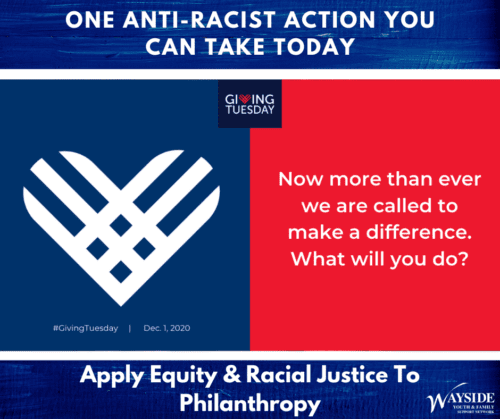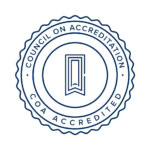One Anti-Racist Action You Can Take Today: Apply Equity & Racial Justice To Philanthropy

By Nicolas M. Kane
Development Manager
Today, Dec. 1, 2020, is Giving Tuesday. If you follow Wayside on social media, you know that we are participating and asking the community to support the work Wayside does by donating to us. Nick Kane, Wayside’s Development Manager, shares why nonprofits should be applying an equity lens to fundraising.
My name is Nicolas Kane. I have the privilege of being male, growing up in a white, Catholic, and loving family, living in an affluent suburban town in MetroWest Massachusetts, and being well educated. In fact, much of my life is full of privilege apart from being Latinx (I was adopted as a baby from Bogotá, Colombia), gay, and someone carrying a diagnosis of ADD.
I have worked in nonprofit fundraising for over a decade, the last two and a half years of which as the Development Manager at Wayside Youth & Family Support Network. Wayside provides a wide variety of mental health counseling and support services to children, young adults, and families in Massachusetts. Chief among Wayside’s values are a commitment to diversity, equity, and inclusion and anti-racist practices. This commitment extends beyond the agency’s clinical work to the administrative side of the agency.
In my role, at times I face ethical issues around accepting donations (both cash and in-kind) including how both the source and intent of contributions may or may not align with the agency’s core values. Wayside’s fundraising is unique as our contributed revenue is not primarily used to support annual operating expenses as in many other organizations. Instead our fundraising allows us to go above and beyond the traditional scope of care we provide for the 6,000 youth and families we serve every year. More simply stated, we can provide emergency food and clothing for families in need, backpacks with school supplies to youth, and presents during the holiday season for the youth in our residential programs.
Within the past year, my colleagues and I have encountered and discussed the following ethical issues impacting potential donations:
- Can/should we accept money or gift cards to support families facing food insecurities to a food provider donated by an organization that historically and currently aligns with other agencies whose values discriminate against populations served by Wayside?
- How do we balance the notion of providing food to a hungry population with the reality that the support to do so comes from an organization whose values contradict our mission?
- What is the impact on the individual served? Do they accept the opportunity to obtain food and compromise their own integrity of identity, or go hungry and retain their sense of self-worth and pride?
- Can/should we accept a cash donation from a company/a company’s philanthropic arm that has been challenged for being a performative organization with no substantial actions around anti-racist work?
- What if it is an in-kind donation and comes to us from an individual or group genuinely invested in our agency’s mission to support the youth and families we serve?
- If an organization works to help with substance abuse treatment and/or substance prevention, should the organization accept a donation (cash or in-kind) from a supplier of legal substances (i.e. marijuana, alcohol, and/or tobacco)?
- What if the donation is designated to be used as a part of the organization’s “educational outreach efforts” (i.e. youth substance abuse/prevention)?
- Can/should we serve alcoholic beverages as a part of our fundraising events?
After thoughtful consideration of these questions, I find myself remembering two things: to consider the spirit in which a gift is given and to hold space for these donors; specifically, around their capacity to change. I am reminded of Wayside’s core values – strength, hope, and resiliency. Wayside believes in a strength-based approach, focusing on affirmative and inspirational strategies that promote sustainable change. We believe in the power of hope as a central factor in providing motivational resources necessary for change.
Consider the following two scenarios:
- A donor of ill repute offers a donation to a nonprofit. The nonprofit declines the donation based on opposing ethical beliefs. The donor changes for the better and then offers the donation to the nonprofit once again. The donation should be re-examined and perhaps accepted.
- A donor offers a donation to a nonprofit. The nonprofit accepts the donation. Time passes and the donor’s true character reveals values and beliefs in diametric opposition to that of the nonprofit. The donation should be re-examined and most likely be returned.
In both instances, I believe we as fundraisers must hold space for a donor’s ability to change and commit ourselves to continued review and revision of our gifts and gift acceptance policies.
Ultimately, nonprofits will continue to rely on philanthropy to support their work and sustain their missions. Nonprofit fundraising and fundraisers must evolve with the times and must apply an equity and racial justice lens to our work.
Over the course of my career in nonprofit fundraising I have come to better understand the impact of privilege. Those like me who are fortunate to have privilege in many ways should utilize that privilege to support equity and social justice for all. It is the responsibility of those who hold the privilege to engage in conversations and actions promoting racial justice and inclusion. Furthermore, working for a mental health/human services agency like Wayside, this problem must be addressed. More specifically, as fundraisers we must challenge the way in which we consider philanthropic contributions and gift acceptance policies to support this effort.

